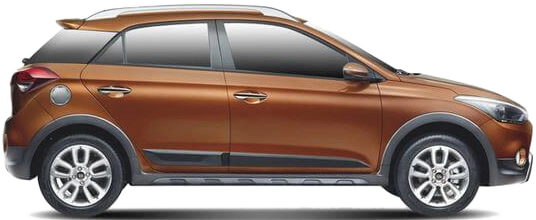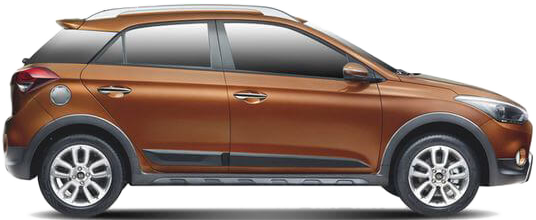The Comparative Analysis :
BMW i3 60 Ah (13 - 17) vs. Hyundai i20 Active 1.4 CRDi (16 - 18)
€ 35,000

€ 20,300

€ 35,000
Base Price ⓘBase price of a new vehicle with standard equipment in Germany at market launch.
€ 20,300
ⓘBase price of a new vehicle with standard equipment in Germany at market launch. Price Info
Vehicle Dimensions
The dimensions of these vehicles differ slightly. The BMW i3 (60 Ah) is 2.6 inches shorter, 0.6 inches wider and 1.9 inches taller than the Hyundai i20 Active 1.4 CRDi.
BMW i3 (60 Ah)
Hyundai i20 Active 1.4 CRDi
62.1
69.9
80.3
60.2
69.3
78
69.9 in
Width
69.3 in
80.3 in
Width Incl. Mirrors
78 in
62.1 in
Height
60.2 in
101.2
157.4
101.2
160
157.4 in
Length
160 in
101.2 in
Wheelbase
101.2 in
Vehicle Weight
BMW i3 (60 Ah)
Hyundai i20 Active 1.4 CRDi
2822 lb
Curb Weight
2756 lb
3594 lb
Gross Vehicle
Weight
Weight
3748 lb

Weight Difference:
66 lb
2.34 %

General
BMW i3 (60 Ah)
Hyundai i20 Active 1.4 CRDi
I01
Generation
GB
Hatchback
Car Body Style
Hatchback
Electricity
Fuel Type
Diesel

Rear-wheel drive
Drivetrain
Front-wheel drive

1-speed automatic transmission
Transmission
6-speed manual transmission
Engine
BMW i3 (60 Ah)
Hyundai i20 Active 1.4 CRDi
Hybrid synchronous motor
Engine Type
Straight-four diesel engine with turbocharger
BMW IB1
Engine Series
IB1-P23
Engine Code
0
Valves
4
0
Cylinders
4
0 L / 0 cu in
Displacement
1.4 L / 69 cu in
168 hp
at 4800 rpm
Power
89 hp
at 4000 rpm
BMW i3 (60 Ah)
168 hp
89 hp
Hyundai i20 Active 1.4 CRDi
184 lb‑ft
at 1 rpm
Max. Torque
177 lb‑ft
at 1500 rpm
BMW i3 (60 Ah)
184 lb‑ft
177 lb‑ft
Hyundai i20 Active 1.4 CRDi
Performance
BMW i3 (60 Ah)
Hyundai i20 Active 1.4 CRDi
93 mph
Maximum Speed
106 mph
7.2 sec
Acceleration 0 to 62 mph
12.3 sec
62 mph
62
mph
mph
328 ft
0.000 sec

BMW i3 (60 Ah)
62 mph
62
mph
mph
561 ft
0.000 sec

Hyundai i20 Active 1.4 CRDi
▶ REPLAY
16.8 lb/hp
Weight-to-Power Ratio
30.97 lb/hp
BMW i3 (60 Ah)
16.8 lb/hp
30.97 lb/hp
Hyundai i20 Active 1.4 CRDi
Fuel Economy / Emissions
BMW i3 (60 Ah)
Hyundai i20 Active 1.4 CRDi
Fuel Economy
21 kWh✽
( 161 MPGe ⓘ Miles per gallon gasoline equivalent (MPGe) is a measure of the average distance traveled per unit of energy consumed. MPGe, specified in miles per U.S. gallon, is used to compare the energy consumption of vehicles that use different energy sources.)
combined ✽ per 100 miles
55 mpg
( 61 MPGe ⓘ Miles per gallon gasoline equivalent (MPGe) is a measure of the average distance traveled per unit of energy consumed. MPGe, specified in miles per U.S. gallon, is used to compare the energy consumption of vehicles that use different energy sources.)
BMW i3 (60 Ah)
161 MPGe
61 MPGe
Hyundai i20 Active 1.4 CRDi
No data
city
44 mpg
No data
highway
62 mpg
19 kWh
Fuel Tank Capacity
13.2 gal
91 mi
Range
723 mi
BMW i3 (60 Ah)
91 mi
723 mi
Hyundai i20 Active 1.4 CRDi
Environmental Impact
42 kWh
Total Energy Consumption
per 100 miles ⓘThe total energy consumption per 100 miles is the amount of energy consumed by a vehicle when burning fuel or using electricity per 100 miles (final energy), and the energy required to produce the appropriate amount of fuel or electricity (primary energy).
per 100 miles ⓘThe total energy consumption per 100 miles is the amount of energy consumed by a vehicle when burning fuel or using electricity per 100 miles (final energy), and the energy required to produce the appropriate amount of fuel or electricity (primary energy).
88.5 kWh
BMW i3 (60 Ah)
42 kWh
88.5 kWh
Hyundai i20 Active 1.4 CRDi
Elektrofahrzeug
Emission Standard
Euro 6b (NEFZ)
0 g/mi (NEFZ)
CO2 Emissions
185 g/mi (NEFZ)
Practical Convenience
BMW i3 (60 Ah)
Hyundai i20 Active 1.4 CRDi
5
Doors
5
4
No. of Seats
5
772 lb
Maximum Payload
992 lb
7.4 cu ft
Trunk Volume
9.2 cu ft





31.1 cu ft
Cargo Volume (Seats Down)
29.5 cu ft















